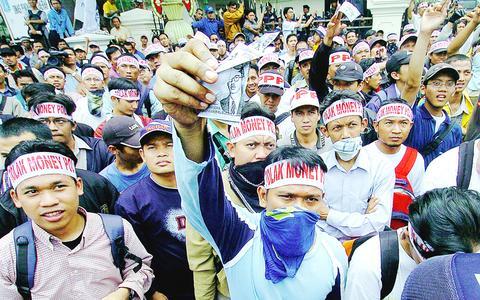Voters handed former General Susilo Bambang Yudhoyono a landslide victory in Indonesia's first direct presidential election after he pledged to fight terror and fix the battered economy, according to official results announced yesterday.
The US-educated candidate will be inaugurated on Oct. 20. Markets and foreign governments will be anxious to see how he intends to fix the problems facing the world's most populous Muslim nation.

PHOTO: AFP
The official results of the Sept. 20 election showed Yudhoyono with 60.62 percent of the vote, ahead of President Megawati Sukarnoputri's 39.38 percent. A total of 115 million people voted.
Yudhoyono was to deliver a formal acceptance speech later yesterday. But earlier in the day, he already began speaking like the new leader.
"I will arrange the makeup of the next government and a program for the first 100 days, and then will explain to the people what the government is truly working for," he told reporters.
A running tally of votes had shown Yudhoyono with an insurmountable lead in the election for more than a week, but he had declined to claim victory and Megawati had refused to concede ahead of the official announcement.
The election was the first in which Indonesia's 210 million people were able to vote directly for their president. The poll was praised as a key step in the coun-try's transition to democracy after the downfall of ex-dictator Suharto in 1998.
Voters hungry for change were impressed by Yudhoyono's grasp of the issues facing the country and his honest image.
Yudhoyono attended officer training college in the US and is popular in Washington because he is seen as a better partner in the war on terror than Megawati was.
Yudhoyono's party holds only 10 percent of the seats in the country's parliament, and some analysts have predicted legislators might block new legislation. Yudhoyono has played down those concerns, and his aides have said the size of his victory gives him a mandate to push through reforms.
Yudhoyono will be Indonesia's sixth president, and the fourth since Suharto's downfall amid nationwide riots and pro-democracy protests.

DITCH TACTICS: Kenyan officers were on their way to rescue Haitian police stuck in a ditch suspected to have been deliberately dug by Haitian gang members A Kenyan policeman deployed in Haiti has gone missing after violent gangs attacked a group of officers on a rescue mission, a UN-backed multinational security mission said in a statement yesterday. The Kenyan officers on Tuesday were on their way to rescue Haitian police stuck in a ditch “suspected to have been deliberately dug by gangs,” the statement said, adding that “specialized teams have been deployed” to search for the missing officer. Local media outlets in Haiti reported that the officer had been killed and videos of a lifeless man clothed in Kenyan uniform were shared on social media. Gang violence has left

US Vice President J.D. Vance on Friday accused Denmark of not having done enough to protect Greenland, when he visited the strategically placed and resource-rich Danish territory coveted by US President Donald Trump. Vance made his comment during a trip to the Pituffik Space Base in northwestern Greenland, a visit viewed by Copenhagen and Nuuk as a provocation. “Our message to Denmark is very simple: You have not done a good job by the people of Greenland,” Vance told a news conference. “You have under-invested in the people of Greenland, and you have under-invested in the security architecture of this

Japan unveiled a plan on Thursday to evacuate around 120,000 residents and tourists from its southern islets near Taiwan within six days in the event of an “emergency”. The plan was put together as “the security situation surrounding our nation grows severe” and with an “emergency” in mind, the government’s crisis management office said. Exactly what that emergency might be was left unspecified in the plan but it envisages the evacuation of around 120,000 people in five Japanese islets close to Taiwan. China claims Taiwan as part of its territory and has stepped up military pressure in recent years, including

UNREST: The authorities in Turkey arrested 13 Turkish journalists in five days, deported a BBC correspondent and on Thursday arrested a reporter from Sweden Waving flags and chanting slogans, many hundreds of thousands of anti-government demonstrators on Saturday rallied in Istanbul, Turkey, in defence of democracy after the arrest of Istanbul Mayor Ekrem Imamoglu which sparked Turkey’s worst street unrest in more than a decade. Under a cloudless blue sky, vast crowds gathered in Maltepe on the Asian side of Turkey’s biggest city on the eve of the Eid al-Fitr celebration which started yesterday, marking the end of Ramadan. Ozgur Ozel, chairman of the main opposition Republican People’s Party (CHP), which organized the rally, said there were 2.2 million people in the crowd, but